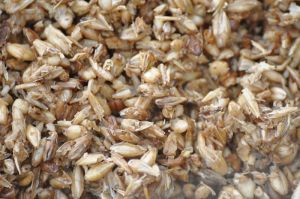TTB Updates Policy on Gluten-Free Labeling/Advertising for Wine, Spirits and Beer
The TTB updated its Policy on gluten-free labeling and advertising for alcohol beverages. Under the updated policy, alcohol beverages that are made from ingredients that do not contain gluten (such as wines fermented from grapes or other fruit and distilled spirits distilled from materials other than gluten-containing grains) may continue to make “gluten-free” claims in the same way allowed in the new FDA regulations for inherently gluten-free products.
Consistent with the new FDA regulations, TTB will continue to consider “gluten-free” label claims for alcohol beverages that are made from gluten-containing grains to be misleading to consumers who are seeking to avoid the consumption of gluten for health reasons. However, products made from gluten-containing grains may be labeled with a statement that the product was “Processed,” “Treated,” or “Crafted” to remove gluten, if that claim is made together with a qualifying statement that warns the consumer that the gluten content of the product cannot be determined and that the product may contain gluten.
 These updates supersedes TTB Ruling 2012–2 with this revised policy. Under TTB’s new revised policy, the term “gluten-free” may be used on labels and in advertisements if the product would be entitled to make a gluten-free label claim under the standards set forth in the new FDA regulations at 21 CFR 101.91.
These updates supersedes TTB Ruling 2012–2 with this revised policy. Under TTB’s new revised policy, the term “gluten-free” may be used on labels and in advertisements if the product would be entitled to make a gluten-free label claim under the standards set forth in the new FDA regulations at 21 CFR 101.91.
In general, the rule provides that foods may be labeled with the term “gluten-free” if they do not contain any one of the following:
(1) An ingredient that is a gluten-containing grain (e.g., spelt wheat);
(2) An ingredient that is derived from a gluten-containing grain and that has not been processed to remove gluten (e.g., wheat flour); or
(3) An ingredient that is derived from a gluten-containing grain and that has been processed to remove gluten (e.g., wheat starch), if the use of that ingredient results in the presence of 20 parts per million (ppm) or more gluten in the food (i.e., 20 milligrams (mg) or more gluten per kilogram (kg) of food). See 21 CFR 101.91(a)(3), 78 FR 47178.
Alcohol beverages that are made without any ingredients containing gluten (such as wines fermented from grapes or other fruit and distilled spirits distilled from materials other than gluten-containing grains, where such products do not include any ingredients containing gluten) may continue to make “gluten-free” claims in the same way allowed in the new FDA regulations for inherently gluten-free products. Yet, the new FDA regulations disqualify foods from bearing a “gluten-free” claim if they contain an ingredient that is a gluten-containing grain, such as wheat, rye, barley, or a cross-bred hybrid of those grains. This prohibition applies regardless of the gluten content of the finished product. Thus, consistent with FDA’s regulations, TTB will continue to consider “gluten-free” label claims for TTB-regulated alcohol beverages made from gluten-containing grains to be misleading.
Accordingly, consistent with FDA’s decision to maintain the status quo for the labeling of beers subject to its regulations pending further rulemaking, TTB has decided that, pending completion of rulemaking by FDA on this issue, TTB will also maintain its current policy, as set forth in TTB Ruling 2012–2, with regard to alcohol beverages made from gluten-containing grains.
You can read the full text of the TTB Update HERE.
Colorado Beverage Lawyers of LaszloLaw
Our Colorado beverage lawyers are ready to assist in obtaining a Colorado Liquor License. Whether you need to transfer, modify, or obtain a new liquor license, our beverage attorneys will start by addressing your needs and continue to provide guidance along the way. Your goals and bottom line are our priority. Contact the Colorado beverage lawyers at LaszloLaw today to discuss your Colorado liquor license needs.

